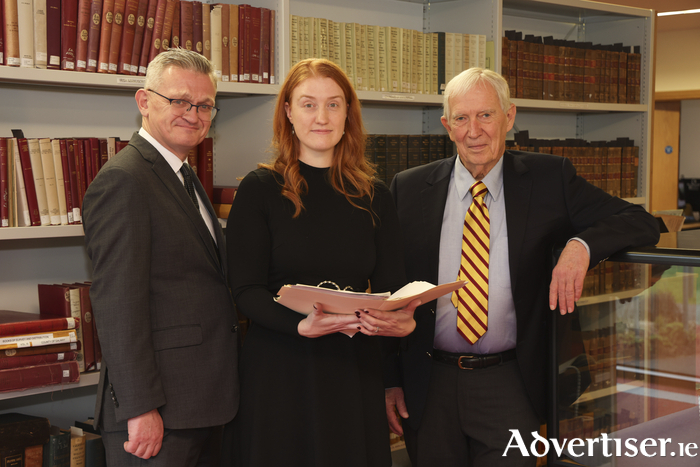University of Galway has launched Imirce, a digital repository of thousands of Irish emigrant letters and memoirs dating from the late 1600s through to the mid-20th century.
Featuring correspondence and other documents sent from North America, the collection offers an unparalleled insight into the personal reflections and lives of people as they wrote home to family and friends in Ireland.
The Imirce project has enabled the creation of an online, publicly accessible archive of the Kerby A. Miller Collection - a unique record of personal correspondence from the Irish diaspora in the US.
The archive includes approximately 7,000 letters, running to more than 150,000 documents, along with other important historical papers. It was collected over five decades of research by Kerby A. Miller, Emeritus Professor of History at University of Missouri and Honorary Professor of History at University of Galway, who donated the material to the University of Galway Library.
The letters and documents provide valuable insights into universal themes and individual perspectives influenced by class, religion, gender and political circumstances. The collection is especially rich in the post-famine period from 1850-1950.
Following the creation of the digital repository, University of Galway Library is actively seeking contributions of other emigrant letters, in particular those written in Irish in North America, and letters and memoirs produced in any language by emigrants from the Gaeltacht.
Details about how to contribute to the collection are available at Imirce.universityofgalway.ie Letter samples
Samples and messages from letters, as originally penned, are being shared as part of the launch:
“We have too many loved ones in the Cemetery here to leave them … We have been here a long time - and it is home to us now.” - Jane Crowe, writing to her brother in Roscommon in 1959.
“... old people are very little thought of in this country, not even There own families have any regard for them when they become played out from age and my own is no Exception as I could not get 1 penny from any of mine but what I can earn myself...” - ditch-digger Patrick McKeown, writing home in 1904.
“Ah Nora, It makes my very heart break when I think right of home … oh Nora I hate to think of it ‘because I do be that homesick and lonely.” - Galway women writing home in 1921.
“I do not care any thing at all about gone home.” “I was born in old Ireland but I am quite happy sometimes I never think I was in old Ireland at all. I never (even ) think of it ... for I do not entend ever to see it.” - Thomas McCann, writing in October 1894.
The Imirce digital repository was developed by an interdisciplinary team, led by Professor Daniel Carey (School of English, Media and Creative Arts ), Cillian Joy (University of Galway Library ) and Professor Breandán Mac Suibhne (Acadamh na hOllscolaíochta Gaeilge ), with the archival work managed by Digital Archivist Marie-Louise Rouget.
Professor Breandán Mac Suibhne, Director of the Acadamh and historian at University of Galway, said letter-writing was long the primary means of communication between Irish emigrants to North America and family and friends at home.
“The Imirce database allows researchers - amateur and professional - to access an extraordinary collection of emigrant letters and memoirs assembled over half a century by historian Kerby A. Miller and it provides a repository in which people can share copies of letters in their possession.
“Imirce is at once an important resource for scholars and a potent connection, across time, between the descendants of emigrants to North America and the people and places around Ireland that their forebears left behind.”
Daniel Carey, Professor of English at University of Galway, said that as an Irish American whose relations left Ireland for America during the Famine, he finds this collection a profound record of the experience of emigrants, recorded in their own voices.
“The challenges of settling in a new country come to life in these letters, through reflections on ordinary events and major upheavals. We see how they kept their relationships going across great distances and reported home on how they were faring in New York, Boston, Philadelphia and so many cities and towns across the continent.”
Cillian Joy, Head of Open and Digital Research, University of Galway Library, said: “This is an exciting moment for the University of Galway Library as we launch this important digital resource to the public. In the spirit of open access, we invite scholars of Irish and North American history and members of the public alike to explore the material and the stories they tell.”
The University has released an initial tranche of material from the Imirce project, with more letters and memoirs to be published over the rest of the year.
The Imirce digital repository project was supported with funding from the Department of Tourism, Culture, Arts, Gaeltacht, Sport and Media and the University of Galway Strategic Fund.
The Kerby A. Miller Collection
Professor Miller donated his vast research collection related to Irish emigration to North America and Irish diaspora identities to the University of Galway Library in 2021.
From the early 1970s, when researching his landmark Emigrants and Exiles: Ireland and the Irish Exodus to North America (Oxford, 1985 ), Miller transcribed writings by emigrants from Ireland to North America held in libraries and archives. Furthermore, looking beyond those repositories, he placed notices in Irish national and local newspapers asking people to send him treasured correspondence, which he and research assistants then copied, transcribed and returned.
Following the publication of Emigrants and Exiles, Miller continued to collect such material. The result is a vast collection of transcripts of the writings of craftsmen, especially weavers and spinners, miners, domestic servants, farmers, and canal, railroad, mill and construction workers.
The collection also includes transcripts of correspondence collected by historian Arnold Schrier when working on his Ireland and the American Migration, 1850–1900 (Minneapolis, 1958 ).

